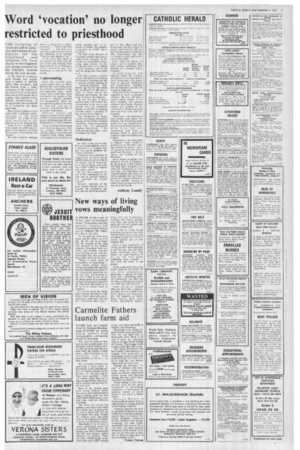Page 7, 3rd September 1976
Page 7

Report an error
Noticed an error on this page?If you've noticed an error in this article please click here to report it.
Tags
Share
Related articles
Vocations Problem
The Vocations Crisis Myth
Re-thinking The Role In Society Priest's
If Each True R Ib
New Problems Of Recruiting For Church
THE fostering of vocations and the selection and training of candidates for the
priesthood and religious life have shared the development and change essential to the Church's renewal during the last decade.
In the field of vocations, such change has largely been a matter of attitude rather than structure, and has flowed from a fuller awareness of the mission of the Church and of the parts both priests and people have to play. This, together with a deeper understanding of young people, has prompted us to reappraise our ideas and work.
The first major difference has come with a renewed understanding of the word
"vocation No longer is this term restricted to the priesthood or the religious life.
Every life is a vocation, and every person is called upon to grow in the likeness of Christ and to share in his sacrifice and mission.
We find ourselves thinking about vocations less in objective terms "What is the hest vocation?" and more in a way which allows God's will for the individual to be fulfilled: "What is God asking of me'?"
AL the same time, much of the mystery has been cast off, and priests and religious have been seen by all us needing to offer sin-offerings for themselves as well as for the people.
Understanding
Since the Council some young people have no doubt felt that they could better serve the Church as members of the now-upgraded laity, while others who would have been attracted by the mystery of the priestly or religious vocation are disappointed when the priesthood is spoken of in terms of "function" and not of "honour", as in the New Rite of Episcopal Ordination.
However, priests and religious are now able to attract others to join them through the deeper understanding and confident practice of their missions.
These developments promise more understanding, too, of the lay vocation, which will establish a strong core of devoted Catholics from whom priests and religious may be chosen, or
whose children may be expected to inherit the qualities necessary to fulfil their vocations.
The work of the Director of Vocations (whether diocesan or religious) has changed. In the past he was represented as lecturing upper juniors on the priesthood with a view to filling a junior seminary, and at the time the image had some truth
10 it.
Now the vocation director sees his initial task as informing the People of God that each has a vocation, thereby building up a "vocation-conscious" cornmunity. Ije will tell them about the prieslhood for all have a right to know about the theology and mission, life and work of priests and religious.
He will also give as much spiritual help and prudent encouragement as he can to any person who has identified himself or herself as thinking seriously about a vocation in the service of the Church.
The obligation to foster vocations by prayer and service belongs to the whole Christian community. There is a pressing need, too, for adequate religious instruction too often lacking these days as a foundation for faith.
Dedication
So while it may not be true that each parish gets the priests it deserves it is certainly true that each parish produces the priests it deserves. Perhaps it is too idealistic to suggest that the local church should choose its own priests, in the manner that St Augustine, on a visit to Hippo, was in his own words "taken by surprise and made a priest".
He had been proposed by one of the congregation as the best man to succeed Valerius and appointed by popular acclaim.
However, members of the local Church should invite to consider the priesthood any man who has shown his dedica
tion to the Mass and the Sacraments, who has a spirit of prayer commensurate with his age, who has shown an ability to take responsibility, and who can relate to others and is willing to serve them.
Care must be taken, of course, not to confuse piety with pietism, obedience with servility, or a liturgist with a rubrician.
In most .dioceses and religious orders the selection procedure has become stricter, and it is only after a full assessment of spiritual, intellectual and psychological suitability that the bishop or superior will accept an applicant.
Every one of the 120 who are expected to enter a diocesan seminary this year will find a course which admits of far more flexibility and pastoral emphasis than before. Pastoral courses are included in the curriculum of all the seminaries and most have links with universities, Significant developments have already taken place. For instance, the Franciscan Study Centre has been established on the campus of Kent University, while Allen Hall was transferred from Ware to Beaufort Street in order that students might attend Heythrop College.
Nevertheless, few seminaries or religious orders would be prepared to say that their training method was perfect. There are questions that must still be asked and discussed for instance, the training for the diaconate.
Every aspect of priestly formation is worthy of discussion by all sections of the Church. The Holy Spirit will guide; and when the discussions are over and ideas and suggestions are collated and put into effect, we will be satisfied that our future priests and religious will receive the best possible training to enable them to witness to Christ and serve the Church.
Anthony Laundy
blog comments powered by Disqus









